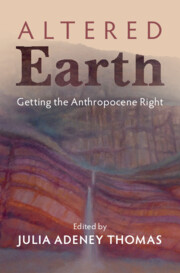Book contents
- Altered Earth
- Altered Earth
- Copyright page
- Dedication
- Contents
- Figures
- Foreword
- Acknowledgments
- Introduction: The Growing Anthropocene Consensus
- Part One Strata and Stories
- Part Two One Anthropocene; Many Stories
- Chapter 3 Earth System Science: Gravity, the Earth System, and the Anthropocene
- Chapter 4 Deep History and Disease: Germs and Humanity’s Rise to Planetary Dominance
- Chapter 5 Anthropology: Colonialism, Indigeneity, and Wind Power in the Anthropocene
- Chapter 6 The Ascent of the Anthropoi: A Story
- Chapter 7 Politics in the Anthropocene
- Chapter 8 Very Recent History and the Nuclear Anthropocene
- Chapter 9 Stratigraphy: Finding Global Markers in a Small Canadian Lake
- Chapter 10 Curating the Anthropocene at Berlin’s Haus der Kulturen der Welt
- Part Three Future Habitations
- Biographies of Chapter Contributors
- Index
- References
Chapter 7 - Politics in the Anthropocene
from Part Two - One Anthropocene; Many Stories
Published online by Cambridge University Press: 24 March 2022
- Altered Earth
- Altered Earth
- Copyright page
- Dedication
- Contents
- Figures
- Foreword
- Acknowledgments
- Introduction: The Growing Anthropocene Consensus
- Part One Strata and Stories
- Part Two One Anthropocene; Many Stories
- Chapter 3 Earth System Science: Gravity, the Earth System, and the Anthropocene
- Chapter 4 Deep History and Disease: Germs and Humanity’s Rise to Planetary Dominance
- Chapter 5 Anthropology: Colonialism, Indigeneity, and Wind Power in the Anthropocene
- Chapter 6 The Ascent of the Anthropoi: A Story
- Chapter 7 Politics in the Anthropocene
- Chapter 8 Very Recent History and the Nuclear Anthropocene
- Chapter 9 Stratigraphy: Finding Global Markers in a Small Canadian Lake
- Chapter 10 Curating the Anthropocene at Berlin’s Haus der Kulturen der Welt
- Part Three Future Habitations
- Biographies of Chapter Contributors
- Index
- References
Summary
What does it mean for politics that human beings have transitioned, or are still transitioning, from the Holocene to the Anthropocene? The latter marks the rise of a new political actor, namely humanity as a whole. Although the disruption of the Earth System was not the result of a conscious decision, securing the habitability of the planet requires a concerted effort on the part of living humans. This chapter suggests that the shared vulnerability of human beings on an increasingly unstable planet may encourage a new self-understanding of the species as a global political agent. In the meantime, three approaches to the Anthropocene can be distinguished: liberal democracy, eco-authoritarianism, and green communitarianism. None of them is being globally implemented, and it would be naive to expect otherwise. They will most likely coexist in the future, thus expressing in different ways the common will to face the dangers of the Anthropocene.
Keywords
- Type
- Chapter
- Information
- Altered EarthGetting the Anthropocene Right, pp. 160 - 181Publisher: Cambridge University PressPrint publication year: 2022
References
- 2
- Cited by

